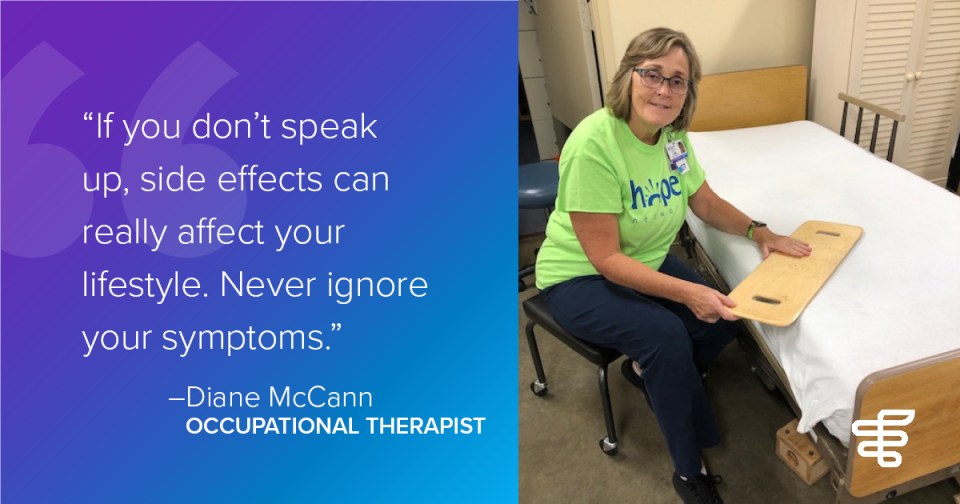Recovery after knee replacement surgery wasn’t going as expected for Lisa Sprague. Only 53 years old, Sprague should have been back on her feet quickly, but spasms in her leg made it nearly impossible for her to walk unassisted.
Sprague was diagnosed with spinal stenosis and initially began her rehabilitation journey at home. When her recovery stalled, her home health physical therapist recommended that she pursue inpatient rehabilitation at Encompass Health Rehabilitation Hospital of Harmarville to help regain her independence.
“I was doing really well at first, but one night I got up to go to the bathroom and my leg was spasming and I couldn’t put any weight on it,” Sprague said. “I couldn’t stand. I couldn’t be in the house by myself, so they got me into Encompass.”
When she arrived at Encompass Health Harmarville, Sprague began working with Diane McCann, occupational therapist, who quickly realized Sprague’s symptoms didn’t match that of a typical knee replacement, but aligned much more closely with multiple sclerosis. Together, the two worked with Sprague’s doctors to get an official diagnoses and begin work toward regaining her independence.
Piecing together the puzzle
Sprague came to Encompass Health Harmarville with the goal of getting back home and back to work—goals that should have been easily achievable for a young patient being treated for a knee replacement and back pain.
“Something wasn’t working,” McCann said. “I noticed she had muscle tone problems and was presenting spasticity in her muscles, which you wouldn’t expect from an orthopedic case.”
McCann has worked at Encompass Health Harmarville for 29 years, and is an integral part of the hospital’s multiple sclerosis rehabilitation program, which holds Disease-Specific Care Certification from The Joint Commission.
“Every case of multiple sclerosis is unique, but the disease does present with certain symptoms,” McCann said. “I saw those symptoms and was checking off the boxes.”
With Sprague’s permission, McCann approached her doctor with what she had observed and her hypothesis as to why Sprague wasn’t progressing while being treated as an orthopedic case.
Further testing confirmed McCann’s suspicions and Sprague was diagnosed with multiple sclerosis. Although the diagnosis can seem scary at first, McCann said, it was an important part in Sprague regaining control of her health and life, and the first step in her journey to independence.
“I was scared; I was relieved; there was so much going on in my mind,” Sprague said. “If I wouldn’t have gone to Encompass, I’d probably still be getting shots in my back for pain and wouldn’t be on the medicine I’m on to stop the progression of it. I thank God that I got in there, and they got answers, and I got the right treatment.”
Treating multiple sclerosis
While each case of multiple sclerosis is unique depending on the affected areas of the brain and spinal cord, there are common approaches to rehabilitation and managing its progression.
For those diagnosed early, treatment focuses largely on wellness, McCann said. This includes education on the importance of exercise, nutrition, sleep, medication and other ways to promote overall wellness. For those who have further progression of the condition, McCann and other therapists help patients manage spasticity and mobility limitations.
Overall, McCann said, it’s important that patients keep their medical teams abreast of their condition, and speak candidly and openly about their concerns, much as Sprague did.
“If you don’t speak up, side effects can really affect your lifestyle,” McCann said. “Never ignore your symptoms.”
Sprague left Encompass Health Harmarville walking with only mild assistance, but more importantly, with the answers and course of action she needed to regain her independence.
The content of this site is for informational purposes only and should not be taken as professional medical advice. Always seek the advice of your physician or other qualified healthcare provider with any questions you may have regarding any medical conditions or treatments.



